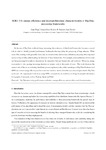Mostrar o rexistro simple do ítem
BDEv 3.0: energy efficiency and microarchitectural characterization of Big Data processing frameworks
| dc.contributor.author | Veiga, Jorge | |
| dc.contributor.author | Enes, Jonatan | |
| dc.contributor.author | Expósito, Roberto R. | |
| dc.contributor.author | Touriño, Juan | |
| dc.date.accessioned | 2019-02-12T17:33:08Z | |
| dc.date.issued | 2018-09 | |
| dc.identifier.citation | Jorge Veiga, Jonatan Enes, Roberto R. Expósito, Juan Touriño, BDEv 3.0: Energy efficiency and microarchitectural characterization of Big Data processing frameworks, Future Generation Computer Systems, Volume 86, 2018, Pages 565-581, ISSN 0167-739X, https://doi.org/10.1016/j.future.2018.04.030. | es_ES |
| dc.identifier.issn | 0167-739X | |
| dc.identifier.issn | 1872-7115 | |
| dc.identifier.uri | http://hdl.handle.net/2183/21721 | |
| dc.description | This is a post-peer-review, pre-copyedit version of an article published in Future Generation Computer Systems. The final authenticated version is available online at: https://doi.org/10.1016/j.future.2018.04.030 | es_ES |
| dc.description.abstract | [Abstract] As the size of Big Data workloads keeps increasing, the evaluation of distributed frameworks becomes a crucial task in order to identify potential performance bottlenecks that may delay the processing of large datasets. While most of the existing works generally focus only on execution time and resource utilization, analyzing other important metrics is key to fully understanding the behavior of these frameworks. For example, microarchitecture-level events can bring meaningful insights to characterize the interaction between frameworks and hardware. Moreover, energy consumption is also gaining increasing attention as systems scale to thousands of cores. This work discusses the current state of the art in evaluating distributed processing frameworks, while extending our Big Data Evaluator tool (BDEv) to extract energy efficiency and microarchitecture-level metrics from the execution of representative Big Data workloads. An experimental evaluation using BDEv demonstrates its usefulness to bring meaningful information from popular frameworks such as Hadoop, Spark and Flink. | es_ES |
| dc.description.sponsorship | Ministerio de Economía, Industria y Competitividad; TIN2016-75845-P | es_ES |
| dc.description.sponsorship | Ministerio de Educación; FPU14/02805 | es_ES |
| dc.description.sponsorship | Ministerio de Educación; FPU15/03381 | es_ES |
| dc.language.iso | eng | es_ES |
| dc.publisher | Elsevier BV * North-Holland | es_ES |
| dc.relation.uri | https://doi.org/10.1016/j.future.2018.04.030 | es_ES |
| dc.rights | Atribución-NoComercial-SinDerivadas 3.0 España | es_ES |
| dc.rights.uri | http://creativecommons.org/licenses/by-nc-nd/3.0/es/ | * |
| dc.subject | Big Data processing | es_ES |
| dc.subject | Performance evaluation | es_ES |
| dc.subject | Energy efficiency | es_ES |
| dc.subject | Microarchitectural characterization | es_ES |
| dc.title | BDEv 3.0: energy efficiency and microarchitectural characterization of Big Data processing frameworks | es_ES |
| dc.type | info:eu-repo/semantics/article | es_ES |
| dc.rights.access | info:eu-repo/semantics/embargoedAccess | es_ES |
| dc.date.embargoEndDate | 2020-10-01 | es_ES |
| dc.date.embargoLift | 2020-10-01 | |
| UDC.journalTitle | Future Generation Computer Systems | es_ES |
| UDC.volume | 86 | es_ES |
| UDC.startPage | 565 | es_ES |
| UDC.endPage | 58 | es_ES |
| dc.identifier.doi | 10.1016/j.future.2018.04.030 |
Ficheiros no ítem
Este ítem aparece na(s) seguinte(s) colección(s)
-
GI-GAC - Artigos [180]






